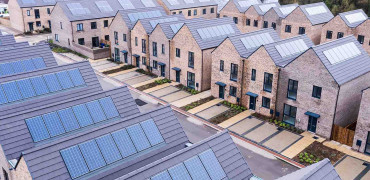Housing associations have led the way in decarbonising home heating and have been champions in the transformation for sustainable living.
In doing so, they have been resourceful, innovative and, as a result, saved their tenants tons of money.
At Mitsubishi Electric our work with housing associations, from the Scottish Isles to the tip of England, is a proud testimony to thousands-upon-thousands of new homes they have built and older properties they have retrofitted.
With the insulation of homes and installation of air source heat pumps, they have made homes warmer, reduced emissions, and cut space heating and hot water costs for their tenants.
Gas is capped at 6p per kilowatt hour (kWh), while electricity prices will be a whopping 24p per kWh.
More equitable pricing
The government’s Social Housing Decarbonisation Fund (SHDF), a 10-year government commitment of £3.8 billion has helped housing associations to raise the energy performance of their housing stock.
However, the positive impact of this funding on personal tenants’ costs could be so much greater – if only the cost of electricity is fairer in comparison to gas.
The price of electricity charged to households is critical. While the environmental and economic benefits of heat pumps are compelling, the cost of electricity remains a significant obstacle.
The success of the transition to sustainable heating solutions hinges on the affordability and accessibility of electricity.
As government strives to create an environmentally robust housing sector, the cost of electricity holds back the adoption of sustainable technologies, such as heat pumps, and with that cheaper electricity for households.
Pricing inequality
The energy price cap announced by the regulator, Ofgem, in February for April to June 2024, shows the inequality of electricity to gas prices.
Gas prices will be capped at 6p per kilowatt hour (kWh), while electricity prices will be a whopping 24p per kWh.
In addition to this, standing charges - a fixed daily charge covering the costs of connecting to a supply – will rise to 60p a day for electricity and 31p a day for gas (although they are regional variations).
This puts unfair costs onto households using more environmentally friendly heating methods, such as heat pumps.
This puts unfair costs on using more environmentally friendly heating, such as heat pumps
A need for a rebalance
On Spring budget day, 6 March, many of us watched and listened anxiously for the Chancellor to announce a move to a balanced and fairer pricing between electricity and gas. It never came.
However, Lord Callanan, the Minister for Energy Efficiency and Green Finance, did not disappoint.
Just hours after the Chancellor walked out of the House of Commons with his budget script, the Minister stood up in the House of Lords to say that “we need to rebalance those costs (between electricity and gas), and the Government will issue a consultation on that later this year.”
Rebalancing this cost would make electricity more affordable – particularly relevant at a time when the cost of living is causing huge strains across the UK.
It would also move household energy requirements away from fossil fuels and volatile oil and gas prices, back UK energy security as the nation moves to renewable energy sources and help to grow the green economy and employment in Britain – particularly if the heat pumps installed are manufactured in Britain (as our Ecodan units are).
Encouraging sustainable heating
Lower electricity prices will encourage more sustainable forms of heating, as offered by heat pumps.
Unlike oil and gas boilers that burn fossil fuels and contribute to greenhouse gas emissions and climate change, air source heat pumps extract heat from the air, which is a renewable source of energy.
In addition to this heat pumps are three to four times more efficient than fossil fuel boilers.
Housing associations stand at the forefront of the sustainable housing revolution and heat pumps have become a linchpin in the effort to create energy-efficient homes.
The SHDF has been a critical government initiative that housing associations have used wisely to undertake projects to upgrade homes, insulating and reducing carbon emissions.
A rebalancing of electricity and gas prices could be a catalyst for change that opens greater opportunities for sustainable heating for the home environment by reducing the financial burden of electricity consumption.
Achilleas Georgiou, Communications Manager for Residential Heating




